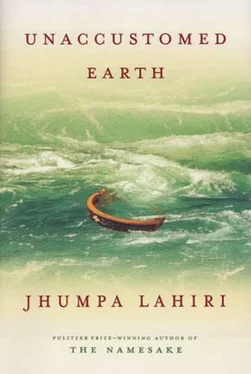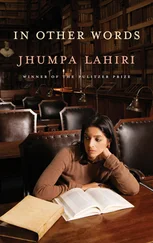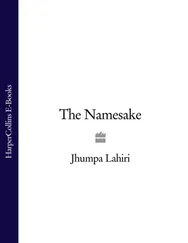"I am Rupa," said the taller one, her voice husky, like her mother's.
"And I am Piu," said the one missing the tooth.
"We are very glad to be in your room," Rupa added. She spoke stiffly, a bit distantly, as if reciting something she'd been forced to memorize. "We are very much appreciating."
They spoke to me in English, their accents and their intonation sounding as severe as mine must have sounded to your fully American ear when we arrived as refugees in your family's home. I knew the accents would soon diminish and then disappear, as would their unstylish sweaters, their silly hairstyles.
"Rupa and Piu are eager to see the Aquarium and the Science Museum," my father said. "Perhaps you can take them one day, Kaushik."
I didn't reply to this. "Very tasty," I said instead in Bengali, referring to the food, something my mother had taught me to say after eating in the homes of other people. I got up to bring my plate to the kitchen.
"You have not eaten," Chitra said, intercepting me. She attempted to take the plate from my hand, but I held on to it and went to the kitchen to pour myself some of the Johnnie Walker my father stored in the cupboard over the dishwasher.
"What do you need? I'll get it for you," Chitra said, following me. I was suddenly sickened by her, by the sight of her standing in our kitchen. I had no memories of my mother cooking there, but the space still retained her presence more than any other part of the house. The jade and spider plants she had watered were still thriving on the windowsill, the orange-and-white sunburst clock she'd so loved the design of, with its quivering second hand, still marking the time on the wall.
Though she had rarely done the dishes, though it was in fact I who had mostly done the dishes in those days, I imagined her hands on the taps of the sink, her slim form pressed against the counter. Ignoring Chitra, I opened one cupboard for a glass and another for the Scotch, but all I found there now were boxes of cereal and packets of chanachur brought back from Calcutta.
My father came into the kitchen as well. "Where's the Scotch?" I asked him.
He glanced at Chitra, and after some small silent communication between them she walked out. "I put it away," he said once we were alone.
"Why?"
"I've stopped taking it. I sleep better at night, I find." "Since when?"
"For some time now. Also, I didn't want to alarm Chitra."
"Alarm her?"
"She's a bit old-fashioned." He pulled out the stepstool that lived in a space beside the refrigerator and unfolded it. He climbed to the top and opened up a cupboard above our refrigerator that was difficult, even with the stepstool, to reach, and took out a half-empty bottle.
I wanted to ask my father what on earth had possessed him to marry an old-fashioned girl half his age. Instead I said, taking the bottle from his hand, "I hope it's all right if I alarm her."
"Just be quiet about it, especially around the girls."
My parents had never been quiet about their fondness for Johnnie Walker, around me, around anyone. After my mother's death, just after I turned eighteen, it was I who filled her shoes, nursing one watered-down glass and then another in the evenings in order to keep my father company before we could both justify going to bed. I almost never drank the stuff at college, preferring beer, but whenever I came home I craved the taste, unable to avoid the thought of my mother when I happened to see an ad for it on a billboard or in a magazine.
"I thought tomorrow, while I'm at work, you could go pick up a tree," my father said. "There's a place not too far down 128. Perhaps the girls would want to join you. They're terribly excited about it."
I looked at him, confused. Until now it had not fully registered that my father would be at work during the days, that I would be alone with Chitra and her daughters.
"You mean a Christmas tree?" For the past three years, since my mother's death, we had not celebrated the holiday at our house. Instead we had fallen into a pattern of accepting invitations at the homes of friends, appearing in the mornings fully dressed while the other family would still be in their pajamas. I would receive a single box containing a sweater or a button-down shirt and watch the family's children open dozens of gifts. In Bombay my mother had always thrown a party on Christmas Day, stringing lights throughout our flat and putting presents under a potted hibiscus. It was a time of year she spoke fondly about Cambridge, about your family and the others we had left behind, saying the holiday wasn't the same without the cold weather, the decorated shops, the cards that came in the mail.
"I suppose we'll have to get some presents," my father added. "We still have a few days. It needn't be extravagant."
I knew Chitra and her girls were probably huddled together in the dining area listening to every word my father and I exchanged, but that didn't stop me from saying, "Those girls are barely half my age. Do you expect me to play with them?"
"I don't expect you to do anything," my father replied evenly. He was unshaken by my remark, perhaps even relieved that we were now officially in opposition, that there was no longer a need to pretend. It was as if he had already played out this scene several times in his mind and was weary of it. "I am only asking if you mind picking up a tree."
I had yet to pour my drink. I'd been standing with my back to the kitchen counter, one hand holding a glass, the other the bottle my father had retrieved for me from its hiding place. I poured it now, taking it as my mother did, with one ice cube, not adding water. I drank what I poured, then poured another.
"Easy," my father said.
I glanced in his direction. After my mother's death he had acquired an expression that permanently set his features in a different way. It was less an expression of sadness than of irritated resignation, the way he used to look if a glass slipped and broke from my hands when I was little, or if the day happened to be cloudy when we had planned a picnic. That was the expression that had come to his face the morning we stepped into my mother's hospital room for the last time, that subsequently greeted me whenever I came home from college, that still seemed directed at my mother for letting him down. But the expression was missing now. "Not easy," I said, shaking my head at my own reflection suspended against the black backdrop of evening. "It's not easy for me."
My father had already left for work by the time I woke up the next morning. For a while I remained in bed, not knowing what time it was, confused, initially, as to why I was in the guestroom and why I could hear the sound of muffled girlish laughter drifting down through the ceiling. The guestroom was located on the first floor of the house, in its own wing off a corridor behind the kitchen. I occupied a double bed, the mattress positioned on a platform low to the ground. On the opposite wall was a sliding glass door facing the backyard and the pool, covered by a black tarp. When we first moved into the house my mother had devoted a disproportionate amount of attention to setting up the guestroom, shopping for the grasshopper-green quilt on the bed, curtains for the sliding glass door, an alarm clock for the bedside table, a soap dish for the adjoining bathroom, asking me to hang a pink and purple Madhubani painting over the chest of drawers. I didn't know who she was expecting to come and stay with us, but by then we indulged her in whatever pastime lifted her spirits. I was grateful for it now, glad not to be upstairs in my old bedroom which shared a wall with my parents' room. It had been awful enough hearing my mother's raspy breathing at night, her moans. Now it would be Chitra and my father I would have heard conversing before bed, their bodies I would have to imagine under a blanket side by side.
Читать дальше












